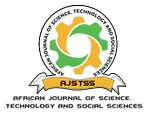Role of societal norms in raw sewage disposal in water sources, Mukuru slums, Nairobi County, Kenya
DOI:
https://doi.org/10.58506/ajstss.v3i2.225Keywords:
Raw Sewage, Disposal, Community Engagement, Sanitation, Societal NormsAbstract
A sustainable sanitation system is economical, socially acceptable, and environmentally friendly. Raw sewage disposal into water sources is a significant environmental and health concern in many informal settlements in Kenya. Inadequate access to proper sanitation facilities leads to water source contamination. Despite the severe environmental and health impacts, there is limited knowledge about the factors influencing these practices. Therefore, this study`s specific objectives sought to determine the role of societal norms influencing the discharge of raw sewage into water sources in Mukuru slums, Nairobi, Kenya. A cluster proportionate random sampling was used to identify household heads, while key informants were purposively selected. A quantitative study of 246 household heads was conducted using structured questionnaires and analyzed using the Pearson Chi-Square Test at 95% Confidence Interval. Qualitative data collected through FGDs, and KIIs, was transcribed and manually presented in narratives. The study findings revealed that 96.1% of raw sewage was discharged into water sources while 87.7% of the participants witnessed raw sewage disposal practices. Raw sewage disposal had influenced societal norms such as belief that played a role in 85.1% of cases (p=0.046). The study concluded that poor societal norms contributed to raw sewage disposal into water sources. The study recommended community to educate her residents on values such as beliefs, collective responsibilities, the presence of social networks, proper communication, cooperation, and coordination to prevent raw sewage disposal in the area and create an enabling environment for all.
References
Abubakar, I. R. (2017). Access to sanitation facilities among Nigerian households: Determinants and sustainability implications. Sustainability, 9(4), 547.
Angoua, E. L. E., Dongo, K., Templeton, M. R., Zinsstag, J., & Bonfoh, B. (2018). Barriers to access improved water and sanitation in poor peri-urban settlements of Abidjan, Côte d’Ivoire. PloS One, 13(8), e0202928.
Appiah-Effah, E., Duku, G. A., Azangbego, N. Y., Aggrey, R. K. A., Gyapong-Korsah, B., & Nyarko, K. B. (2019). Ghana's post-MDGs sanitation situation: an overview. Journal of Water, Sanitation and Hygiene for Development, 9(3), 397-415.
Bamlaku Golla, E., Gelgelu, T. B., Deguale Adane, M., Tsegaye Giday, T., Asres, A. W., & Adafrie, T. T. (2023). Latrine utilization and associated factors among rural households in Southwest Ethiopia: Risk, attitude, norms, ability, and self-regulation behavioral model. Environmental Health Insights, 17. doi:10.1177/11786302231163956
Bicchieri, & Noah. (2017). Applying Social Norms Theory in CATS Programming. New York: University of Pennsylvania.
Chaudhary, M., & Walker, T. R. (2019). River Ganga pollution: Causes and failed management plans (correspondence on Dwivedi et al. 2018. Ganga water pollution: A potential health threat to inhabitants of Ganga basin. Environment International 117, 327–338). Environment international, 126, 202-206.
Collins A. L, Newell Price J. P, Zhang Y, Gooday R, Naden PS, Skirvin D (2018) Assessing the potential impacts of a revised set of on-farm nutrient and sediment ‘basic’ control measures for reducing agricultural diffuse pollution across England. Scientific Total Environment 621:1499–1511. https://doi.org/10.1016/j.scitotenv.2017.10.078
Dey, D., Martens, M., Eggen, B., & Terken, J. (2019). Pedestrian road-crossing willingness as a function of vehicle automation, external appearance, and driving bahaviour. Transportation research part F: traffic psychology and behavior, 65, 191-205.
Doron, A., & Jeffrey, R. (2018). Waste of a Nation: Garbage and Growth in India. Cambridge, MA: Harvard University Press.
Ferronato, N., & Torretta, V. (2019). Waste mismanagement in developing countries: A review of global issues. International Journal of Environmental Research and Public Health, 16, 1060.
Kamara, J. K., Galukande, M., Maeda, F., Lu-boga, S., & Renzaho, A. M. N. (2017). Understanding the challenges of improving sanitation and hygiene outcomes in a community-based intervention: A cross-sectional study in rural Tanzania. International Journal of Environmental Research and Public Health, 14(6), 1–16. https://doi.org/10.3390/ijerph14060602.
Kariuki, T. M., Kagendo, D., & Kaimuri, M. (2023). Influence of socio-economic factors on utilization of sanitation facilities by women In Mukuru Kwa Reuben informal settlement In Nairobi County. African Journal of Science, Technology and Social Sciences, 2(2), 108-121.
Kipngeno Aaron; Patrick Kubai; Josephine Mutembei. "Social-Cultural Factors Influence on Management of Shared Sanitation, in Nakuru Town West Slums.” Volume. 9 Issue 8, August - 2024 International Journal of Innovative Science and Research Technology (IJISRT), www.ijisrt.com. ISSN - 2456-2165, PP:- 2613-2625, https://doi.org/10.38124/ijisrt/IJISRT24AUG1709
Kola, L., Kohrt, B. A., Hanlon, C., Naslund, J. A., Sikander, S., Balaji, M., ... & Patel, V. (2021). COVID-19 mental health impact and responses in low-income and middle-income countries: reimagining global mental health. The Lancet Psychiatry, 8(6), 535-550.
Matsuoka, K., Kobayashi, T., Ueno, F., Matsui, T., Hirai, F., Inoue, N., ... & Shimosegawa, T. (2018). Evidence-based clinical practice guidelines for inflammatory bowel disease. Journal of gastroenterology, 53(3), 305-353.
Ngatia, M., Kithiia, S. M., & Voda, M. (2023). Effects of anthropogenic activities on water quality within Ngong river sub-catchment, Nairobi, Kenya. Water, 15(4), 660.
Novotny, J. et al. (2017). The Role of Perceived social Norms in Rural Sanitation: An Explorative Study from Infrastructure-Restricted Settinges of South Ethiopia. Internal Journal of Environmental Research in Public Health, 14(7).
Pickering, A. J., Null, C., Winch, P. J., Mangwadu, G., Arnold, B. F., Prendergast, A. J., ... & Humphrey, J. H. (2019). The WASH Benefits and SHINE trials: interpretation of WASH intervention effects on linear growth and diarrhea. The Lancet Global Health, 7(8), e1139-e1146.
Qadri, R., & Faiq, M. A. (2020). Freshwater pollution: Effects on aquatic life and human health. In Fresh Water Pollution Dynamics and Remediation (pp. 15-26). Springer. DOI: 10.1007/978-981-13-8277-2_2
Tsekleves, E., Fonseca Braga, M., Abonge, C., Santana, M., Pickup, R., Yongabi Anchang, K., ... & Roy, M. (2022). Community engagement in water, sanitation and hygiene in sub-Saharan Africa: does it WASH. Journal of Water, Sanitation and Hygiene for Development, 12(2), 143-156.
United Nations Environment Programme. (2021, August 25). Better sewage treatment critical for human health and ecosystems. UNEP. https://www.unep.org/news-and-stories/story/better-sewage-treatment-critical-human-health-and-ecosystems
Vetters, N. (2023). Community engagement in waste management: Empowering local solutions. Journal of Environmental Waste Management and Recycling, 6(6), 172.


